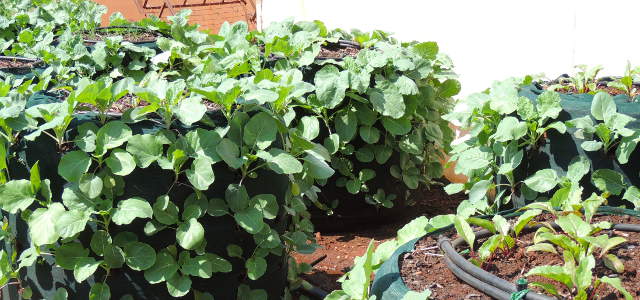 Wavinya Nzioka, the co-founder of Wavinya Nzioka foundation, has launched vertical sack farming with women and youth groups in Makueni that is increasing food production by 75 fold, in an effort to end the region’s constant food shortages.
Wavinya Nzioka, the co-founder of Wavinya Nzioka foundation, has launched vertical sack farming with women and youth groups in Makueni that is increasing food production by 75 fold, in an effort to end the region’s constant food shortages.
‘I was raised and bred in Makueni County, a very dry area with water shortages. Food was and still is hard to come by. Having grown being faced with lack of food and malnutrition, my friends and I started this foundation to help women grow enough food for their families and make some little cash,’ she said.
With this technology, a space that can be occupied by two sukuma wiki seedlings planted the conventional way, can be occupied by one sack that can hold up to 150 pieces of sukuma wiki.
‘If we had used the conventional way to plant the sukuma wiki, the same space that holds one sack of planted 150 pieces would only accommodate two plants, as this method requires spacing between the crops thus decreasing yields,’ she added.
This creative innovation is an efficient water management venture as the sacks are tailored to ensure that there is no water seepage or waste, thus ensuring all plants are well watered.
Related News: Seed company launches kales variety which is best for ulcer patients
‘This is one of the major reason the Foundation settled on introducing vertical sack farming as Makueni is faced with water shortages and poor rainfall. With this farming, farmers need to just water the plants in the morning and evening with just five litres of water,’ she said.
Apart from ensuring food security, this farming has proved to be economically viable. One sack can produce five kilograms of sukuma wiki per week that can fetch Sh100 a kilogram when sold.
‘The venture also aimed at economically empowering women and youths. For instance, a group that has 10 sacks and harvests five kilograms per sack in one week, can make approximately Sh5000 a week,’ said Wavinya.
This has delivered improvements in families’ nutrition and their living standards.
Related News: Company contracts farmers to supply supermarkets with onions, tomatoes, kales, spinach and mushrooms
The foundation provides the groups with sacks, seedlings and education on how to construct and install the sack gardens. The groups, for their part, provide soil, manure and tools.
They plant vegetables such as Sukuma wiki, spinach, managu kunde and other leafy green vegetables.
The foundation, which was started one year ago and has engaged 31 women and youth groups, was started by Wavinya and her friends in line with sustainable development goal number two (SDG2) of zero hunger i.e. food security and as a source of income generation.
Their approach has proven to be an efficient and inexpensive means of increasing food security, dietary diversification, income generation and a way for households to be self-reliant. Further, production can be done all year round with low inputs required.